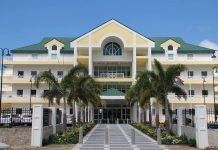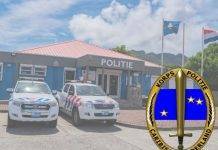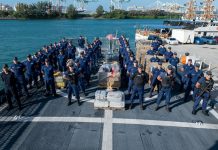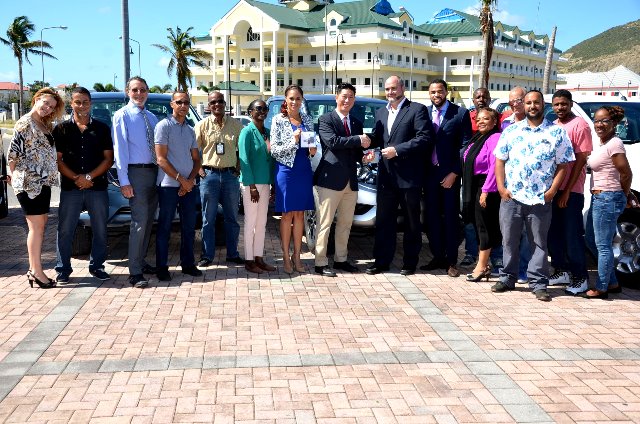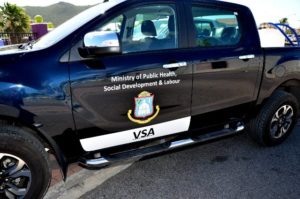 PHILIPSBURG, Sint Maarten — The Ministry of VSA received 14 new vehicles as part of the Emergency aid of the Netherlands offered to St. Maarten post hurricane Irma and Maria. Seven of those vehicles were handed over to Ministry on Friday February 16th.
PHILIPSBURG, Sint Maarten — The Ministry of VSA received 14 new vehicles as part of the Emergency aid of the Netherlands offered to St. Maarten post hurricane Irma and Maria. Seven of those vehicles were handed over to Ministry on Friday February 16th.
As a result of the hurricanes, the Ministry’s daily operations were heavily affected, and in some cases put to a standstill by the lack of vehicles as almost all of its vehicles were severely damaged. The request for vehicles was a direct request of the Ministry to the Netherlands as part of the crisis emergency aid offered by the Netherlands. The vehicles form a critical part of operations, several tasks such as inspections of restaurants, medical and pharmaceutical service providers, job sites and much more can now be intensified by the Ministry staff.
As some of the aid requests to Government are now being realized, many may question: why only now? As is the situation with many other islands hit during the 2017 hurricane season, vehicles and other essential products and materials have been challenging to source within a short time frame. The fleet of vehicles received had specific requirements for the wide range of work that is carried out by the staff and the terrain conditions on the island, this was important to ensure that the ministry can make the best use of the vehicles and for a long period of time. The vehicles were sourced by local dealerships, one of the perquisites to obtaining them – ensuring warranty and service maintenance, but also stimulating the local economy in this time of recovery.
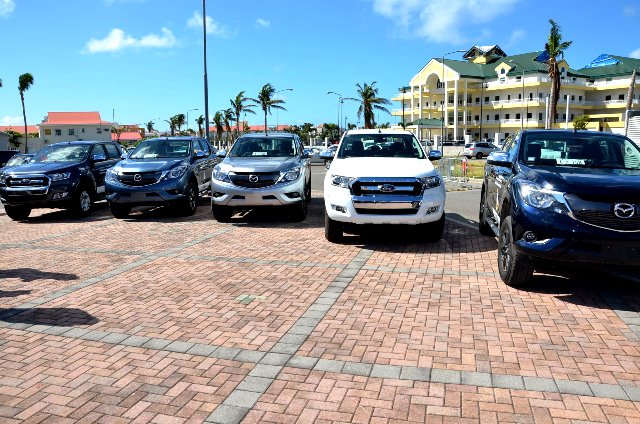
“On behalf of the Ministry of Interior and Kingdom Relations BZK of the Netherlands it is my honor to be able to hand over these much needed vehicles to VSA. Throughout the emergency, recovery and rebuilding process the Netherlands has been a reliable and beneficial partner for St Maarten and its people. This is another example of the benefits of cooperation and partnership in our Kingdom,” stated head of the Dutch Representation office on St Maarten Chris Johnson.
All vehicles will be tagged with the UTS Secure tracking device made available by UTS. The tracking devices offer digital fleet monitoring and management options that will allow for greater measure of supervision and accountability by the Ministry. Features include driver behavior alerts such as speeding, idling time etc., overview of past trips, geo-fencing and much more. These features will enable the ministry to be more effective in carrying out its duties, reporting and costs containment. The work carried out can be monitored by management and staff to ensure accountability in the use of government vehicles.
“I am happy that we have received these vehicles in what was our darkest hour of need. Post-Irma, our entire team was hands on within the community, with extremely limited resources to do what was necessary to not only assess but assist where we are required to do so. Requesting emergency aid and actively pursuing this was top priority for me. It was my duty to ensure that the Ministry remained operational and directly assess what was needed to do so after the passing of Irma and Maria. The damage caused by the hurricanes caused a ripple effect which we all are still feeling. We are happy that slowly but surely, we too here at the Ministry can get back to work as usual. These vehicles will surely allow us to do so. Kingdom Affairs was very quick and collaborative in response to our request for aid and I am appreciative of this. Our staff can now go out and carry out their tasks effectively, knowing that they are safe, and have the tools to manage their operations in an accountable manner.” – Emil Lee (Minister VSA)
The Ministry of VSA consists of several departments which make use of Government vehicles. The Inspectorate, Collective Prevention Services, Department of Social Affairs and Labor, Community Development and the Ambulance department of which their new vehicles are pending arrival. Collectively these departments carry out health inspections, job-site inspections, occupational safety inspections, bottled water testing, community outreach programs, disease prevention controls, rat and mosquito vector controls, community help desk programs, preventive health and response, youth vaccination, labor mediation services and more.




